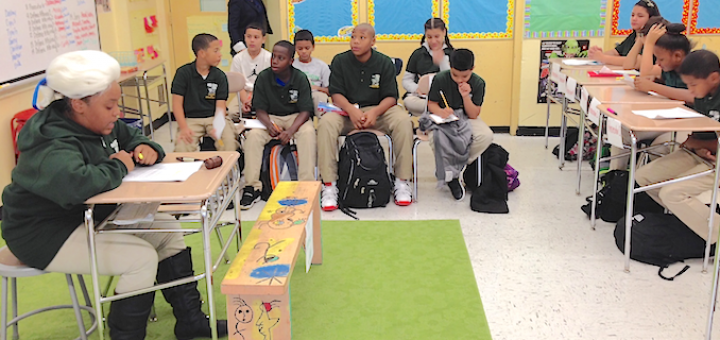Teaching and learning in grades 4-8
Urban ELA teacher Mackenzie Grate found mock trials to be the perfect vehicle to encourage reading, teach speaking & listening, and prepare her 6th graders for their first argumentative writing essay. How-to tips, downloads and lessons learned included.
Sarah Cooper leaves her MS classroom behind for a few hours to experience life as a history student again. Her online course proves calming and stimulating, challenging and refreshing. She sees how content area PD can strengthen her classroom practice.
In this brisk book in ASCD’s Arias series, Jane Bluestein reviews 7 popular classroom management practices that don’t work and then offers teacher behaviors that can build a positive learning environment. Reviewer Angie Grimes finds the 43-page book “short, sweet, and to the point.”
The authors of “Blended” clearly know their stuff, says principal/reviewer Matt Renwick, providing multiple examples of blended learning supported by technology. But Renwick questions the heavy corporate focus and one-sided citations he finds pervade the text.
Dan Feigelson makes the case for reimagined reading projects and goes on to share conversations, student notes, and teacher conference plans. The result, says reviewer Linda Biondi, is a fresh approach to having students think for themselves and helping teachers take conferring to a new level.
Culture building is a powerful method for shaping the behavior of those who work in a school because it helps establish important values and underlying assumptions about learning. Ron Williamson and Barbara Blackburn offer 3 tips for middle grades leaders.
Initial failures can produce big breakthroughs, as ELA consultant Sarah Tantillo found when students she was supporting failed to translate PARCC practice prompts into viable essays. Check out the tools Tantillo, teachers & tutors used to solve the problem.
Elizabeth Stein gives readers a look inside an inclusive classroom as Mrs. Rhodes and Mrs. Copeland share their love for learning with students while putting UDL techniques into action. Elizabeth shares five co-teaching tips that come alive in the two teachers’ high energy classroom.
STEM curriculum expert Anne Jolly invites students to consider how to get the most out of the engineering design challenges they will be asked to solve in their middle school math and science classes, using innovative thinking, analysis and teamwork.
Teacher Mary Tarashuk has reasserted her “Irish Zen” following the full frontal assault on PARCC testing in her last post. She describes how her fourth graders had fun learning about Chinese New Year while also practicing for the high stakes test in prescribed ways.







































